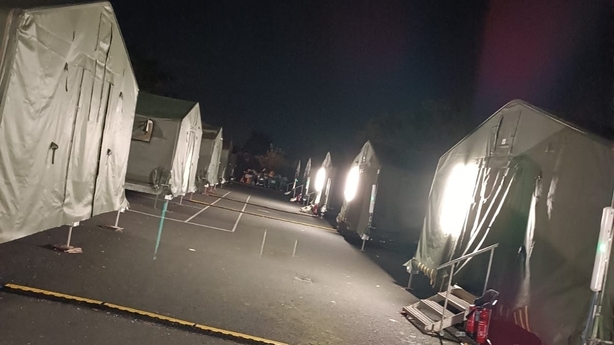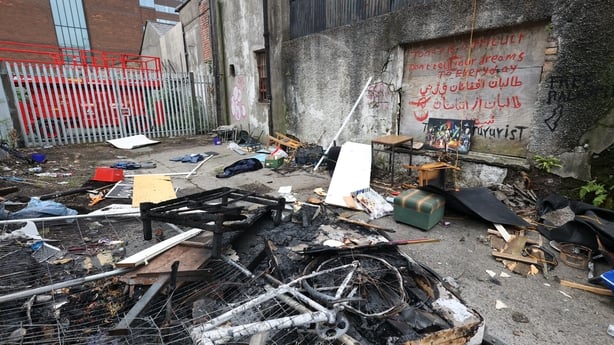Measures are being put in place so that asylum seekers left without State-provided accommodation in the coming days will not be left sleeping rough, Minister for Children Roderic O'Gorman has said.
Speaking in Dublin, the minister re-iterated that the State "is likely" to run out of accommodation "for everyone seeking international protection in the next number of days".
On Friday evening, his department warned that this might happen over the weekend, but a spokesperson confirmed that both yesterday and today, all newly arrived asylum seekers who needed accommodation were offered a space.
Mr O'Gorman said that the State should "run out of accommodation" as predicted they were "putting in place targetted measures where we can identify those who are sleeping rough and end that".
He said they were working with homelessness services and An Garda Síochána on this.
However, this evening the Dublin Regional Homeless Executive issued a statement stating that it "does not have a remit for the accommodation of applicants seeking international protection."
It added that "homeless services in Dublin are operating at full capacity."
Earlier, Mr O'Gorman also said that the weekly expenses allowance of €38.80 paid to international protection applicants "would need to be increase for those we aren't able to accommodate".
Rise in asylum seekers living in tents
Mr O'Gorman's comments come as the number of asylum seekers accommodated by the State in tents rose by just over 180 within a week.
The number of international protection applicants living in State-provided accommodation, including emergency accommodation and tents, passed 26,000 for the first time at the end of last month.
The most recent figures released by the department show that as of last Sunday, the number of international protection applicants living in tents rose to 620, up from 437 the Sunday before.
This is the highest number of asylum seekers living in State-provided tented accommodation at one time.
The International Protection Accommodation Service runs three tented accommodation facilities; the largest is on the grounds of the former Central Mental Hospital in Dundrum in Co Dublin, another sees military tents pitched alongside the direct provision centre in Knockalisheen in Meelick in Co Clare, and there is a third at Columb Barracks in Mullingar in Co Westmeath.

Around this time last year, President Michael D Higgins was among those who raised concerns about the continued use of such tents to house asylum seekers in winter, stating it "shouldn't happen".
By mid-December last year all asylum seekers were moved out of tented accommodation, but a decision to "cease" using these tents was reversed a few weeks later amid accommodation shortages.
A decision to pause offers of accommodation to all newly arriving adult asylum seekers who presented without children followed in late January as Minister O'Gorman said there was not enough accommodation available to meet the demand.
Between 24 January and 15 June, a total of 1,542 adult asylum seekers were not initially offered accommodation when they first presented, and they often had to wait weeks and sometimes months to be offered a place.
On Friday, a spokesperson for the Department of Integration said that once again there was "insufficient accommodation available nationwide for international protection applicants" and it "may not be able to provide accommodation to all international protection applicants" in the coming days.
Should this happen, a department spokesperson said that "drop-in day services will be available to unaccommodated IP (international protection) applicants who wish to avail of them" and those services will "provide tents and sleeping bags, where required."

On 21 April, the High Court found that Minister O'Gorman's failure to provide "material reception conditions" to a homeless asylum seeker was unlawful.
On 12 May, tents and other items belonging to homeless asylum seekers were set on fire on Sandwith Street in Dublin, following a tense standoff between anti-immigration protesters and those who turned out in support of the asylum seekers.
'Deep concern'
This week, the Irish Human Rights Equality Commission (IHREC) wrote to Minister O'Gorman to express its "deep concern" over reports of a shortfall in emergency accommodation for applicants seeking international protection.
IHREC Chief Commissioner Sinéad Gibney warned that "any refusal of shelter by the State puts (international protection applicants) at high risk on the streets, particularly in the context of increased activity by those wishing to foment anti-immigrant sentiment."
A spokesperson for the department described the current situation as "extremely difficult".
"Department officials are working intensively to bring more bed spaces into use, and since January 2022 have brought over 10,000 bed spaces into use to accommodate those who arrive in Ireland seeking International Protection.
"Various issues beyond the control of the department have resulted in offers not being progressed, and accommodation not contracted, swiftly enough to meet the demand."
In addition to the 26,000 people currently living in International Protection Accommodation Service accommodation, there are over 74,000 Ukrainian refugees who have sought accommodation from the State.
It is understood that a plan, announced in October, to build winter ready cabins that could accommodate up to 950 newly arriving Ukrainian women and children on a temporary basis at site in Glendalough in Co Wicklow was abandoned.
A similar scheme has gone ahead in Stradbally in Co Laois, but it is understood thaat no-one has been moved onto the site yet.
System at 'breaking point'
The Director of the Jesuit Refugee Centre said that the accommodation system is at breaking point, as there are 26,000 people in IPAS accommodation at present.
Eugene Quinn said that the last time Ireland was unable to accommodate people, a number were on the street, and he said that this could happen again.
Speaking on RTÉ's This Week, he said that he was concerned for peoples' safety on the street, whether they were homeless, a refugee or an asylum seeker, as there are huge risks on the streets, as well as the challenging environment of recent weeks.
"People are in tents, families of five in single rooms in houses, three families in a three-bed house, people in pods in repurposed commercial buildings and now there is a prospect that people will not be offered accommodation by the end of this week," he said.







